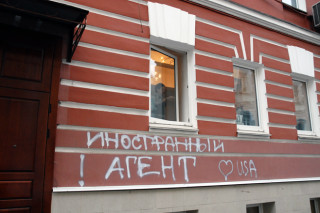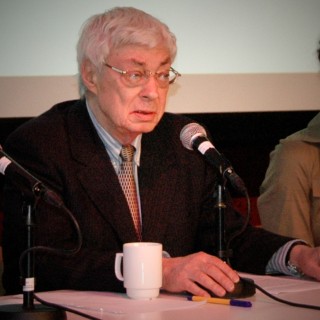
New Managing Director for Bellona Norway
The Board of the Bellona Foundation has appointed former Minister of Climate and the Environment Sveinung Rotevatn as Managing Director of Bellona No...
News

Publish date: January 13, 2015
Written by: Charles Digges
News
ST. PETERSBURG – Citizens’ Watch, an influential St. Petersburg-based judicial and law enforcement watchdog, returned from the Russian holidays to find itself locked in a new freeze: The group has been declared a “foreign agent” by Russia’s Ministry of Justice, its chairman Yelena Shakhova confirmed in an interview to Bellona Tuesday.
The group was one of six new NGOs the Justice Ministry bestowed with the Soviet-era moniker on New Year’s Eve, Russia’s biggest holiday, independent Russian news outlets reported.
The Ministry, under new powers granted to it by Russian President Vladimir Putin in June 4, has since the summer been allowed to determine on its own who should be included on its foreign agent list under the NGO law, which took force in November 2012.
Under that law, NGOs receiving foreign funding and supposedly engaged in vaguely defined “political activity” where to report themselves as foreign agents to the Justice Ministry. Apparently disappointed by the lack of volunteers coveting this title, Putin this summer allowed the Justice Ministry to make its own determinations.
Shakhova told Bellona she was not surprised when Citizen’s Watch was tarred as a foreign agent.

“There had been included by that time on the roster [of foreign agents] our partners and friends carrying out similar activities,” she said in a telephone interview. “So this did not cause great surprise. Pressure against independent NGOs has only been intensifying.”
As with many organizations now included on the Justice Ministry’s ballooning list of foreign agents, the introduction of Citizens’ Watch started with the heavy prosecutor-driven sweeps spanning from in March of 2013 to June 2014.
Shakhova told Bellona that the designation of Citizens’ Watch as a foreign agent began as one of these prosecutors’ investigations – initiated, she said, by a “tip.”
The group received a so-called Notice of Violation from prosecutors dated December 18 – reproduced in English translation on the group’s website – which said Citizen’s Watch was “engaged in political activity.”
The letter gave the group a month to eradicate any alleged wrongdoing, to submit a detailing of its activities, and report to prosecutors with a review of changes the organization was told to make.

But Shakhova told Bellona that before the group had a chance to respond to prosecutors’ demands, the Justice Ministry swooped in and put it on the foreign agent list.
‘Political activity’
The Notice detailed Citizens’ Watch’s political activity as including “express[ing] an opinion that other legal regulations must be developed” in Russia’s judicial system; that participants in a 2013 workshop on judicial reform hosted by the organization “discussed the need to amend the law as concerns the procedure of making the court verdict,” and that it held a “training course” with members of the British Ministry of Foreign Affairs on creating a European-style probation system in Russia that would differ from standard Russian probation practices.
These courses, said the prosecutors’ office were a “deliberate action to develop the public opinion” of penal system employees “with participation of foreign specialists.”
Another 2013 seminar held by the group sought means by which the workings of Russia’s judicial system could be made more transparent to the media.
Prosecutors said that because participants in the seminar “gave an independent interpretation of the current federal legislation regulating the interaction of judicial authorities and mass media” the seminar was “evidence of the fact that the participants of the workshop made statements in the discussion containing an evaluation of current criminal procedure legislation.”
Court and further
Shakhova told Bellona that the group is trying to indemnify itself against further action as it prepares its dispute to the Notice of Violation in court.
“Otherwise, we face an enormous fine that we have no funds to cover,” she said.
She said Citizens’ Watch is also preparing an activities report that designated foreign agents are required to submit to the Justice Ministry. It’s pushing a January 15th deadline.
Close ties with Bellona
For two decades, Citizen’s Watch has worked actively with Bellona, and the groups late chariman, Boris Pustyntsev, was a co-founder of the St. Petersburg-based Environmental Rights Center (ERC) Bellona. Pustyntsev passed away last March.

ERC Bellona has been headed since it’s founding by Bellona’s Alexander Nikitin. Nikitin, a former submarine captain and military nuclear safety inspector, was in 1996 charged with treason for his contribution to Bellona’s report The Russian Northern Fleet: Sources of Radioactive Contamination.
Citizens Watch was instrumental in having the charges against Nikitin dropped by the Presidium of the Russian Supreme Court in 2000.
With its most recent sweep, the Justice Ministry has brought the number of foreign agents on its list to at least 30, according to tallies by Radio Svoboda (in Russian).
The list includes some of the country’s most storied and authoritative groups. Ecodefense, one of Russia’s oldest anti-nuclear groups, in August, became the first environmental groups to be listed as a foreign agent. Other groups such as the Golos vote monitoring association, the PIR Center of lawyers for constitutional rights and freedoms, the Memorial human rights center, the Agora human rights organization, Public Verdict, Soldiers’ Mothers of St. Petersburg, and the Sakharov Center.
Aside from Citizens’ Watch, the latest Justice Ministry sweep added the Moscow-Based Fund for Support of Free Speech, which publishes the fiercely independent New Times newspaper.
It also took down two more groups from St. Petersburg – the Human Rights Resource Center, and the League of Women Voters. Further afield the “Man and Law” rights group in Mari El, and Pskov’s Revival Center of Social Engineering.

The Board of the Bellona Foundation has appointed former Minister of Climate and the Environment Sveinung Rotevatn as Managing Director of Bellona No...

Økokrim, Norway’s authority for investigating and prosecuting economic and environmental crime, has imposed a record fine on Equinor following a comp...

Our op-ed originally appeared in The Moscow Times. For more than three decades, Russia has been burdened with the remains of the Soviet ...

The United Nation’s COP30 global climate negotiations in Belém, Brazil ended this weekend with a watered-down resolution that failed to halt deforest...